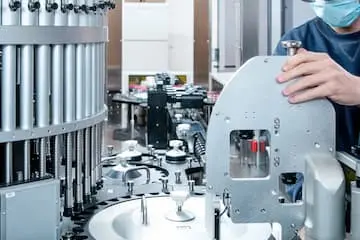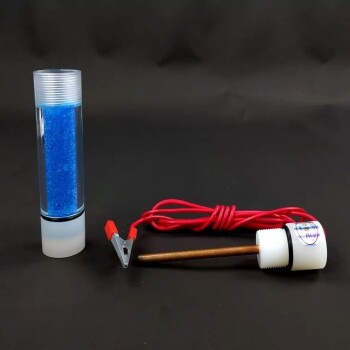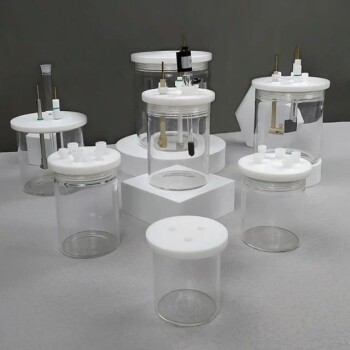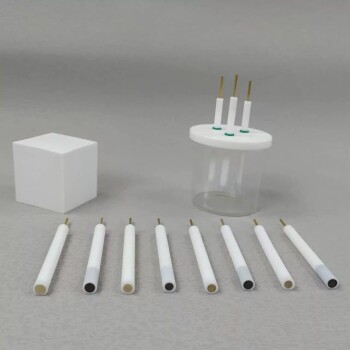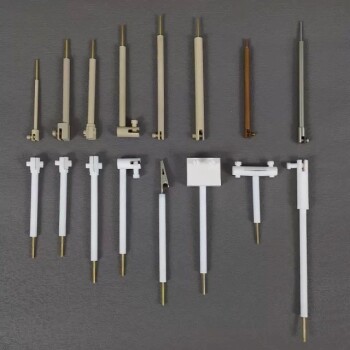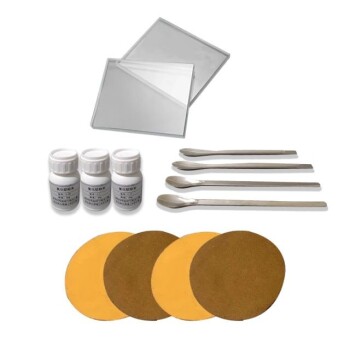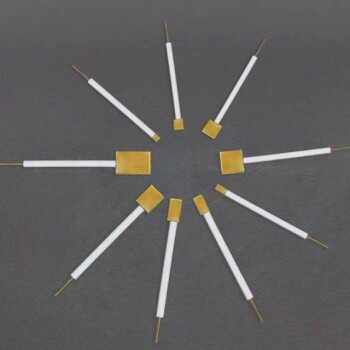An electrochemical electrode is a device that conducts an electrochemical reaction and measures its electrical potential. It consists of a conductive material that is immersed in a solution containing the analyte. The electrochemical reaction produces an electrical signal that can be measured by a voltmeter. Electrochemical electrodes are widely used in analytical chemistry, biochemistry, and materials science. They are classified into several types depending on their mode of operation, such as potentiometric, amperometric, and voltammetric electrodes. Electrochemical electrodes are essential tools for studying electrochemical reactions and developing electrochemical devices.
Toggle Categories
Get Instant Support
Choose your preferred way to connect with our team
-
Get Free Quote Fill out form for detailed pricing
-
Send Email Detailed inquiry support
-
WhatsApp Quick mobile chat
Response Time
Within 8 hours on working days, 24 hours on holidays
electrochemical electrode

Conductive Carbon Cloth Carbon Paper Carbon Felt for Electrodes and Batteries
Item Number: ELCPF
$19.90
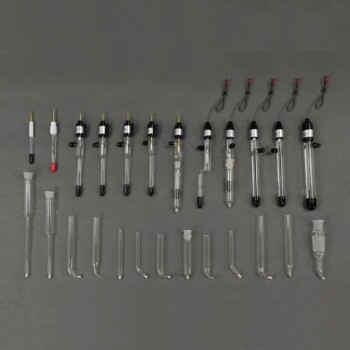
Reference Electrode Calomel Silver Chloride Mercury Sulfate for Laboratory Use
Item Number: ELERA
$19.90

Platinum Sheet Electrode for Battery Lab Applications
Item Number: BC-09

CF KF Flange Vacuum Electrode Feedthrough Lead Sealing Assembly for Vacuum Systems
Item Number: KT-VA08
We have the best electrochemical electrode solutions to meet the needs of any laboratory equipment. Our wide range of standard solutions and bespoke design service ensure that we can meet almost any customer requirement. We offer a variety of reference electrodes, including the silver/silver ion pseudo-reference electrode, as well as auxiliary electrodes made of platinum, carbon, copper, or stainless steel. We also provide battery and electrolysis electrodes, as well as the quinhydrone electrode to simplify the process of determining hydrogen ion concentration. Trust us to provide the highest quality electrochemical electrode solutions for your laboratory needs.
Applications of Electrochemical Electrode
- Electrolysis
- Batteries
- pH measurement
- Corrosion studies
- Bioelectrochemistry
- Environmental analysis
- Medical diagnostics
- Fuel cells
- Water treatment
- Industrial process control
Advantages of Electrochemical Electrode
- High sensitivity and selectivity in detecting target analytes.
- Can be used to monitor various chemical and biological processes in real-time.
- Low detection limits, making them useful in trace analysis applications.
- Easy to use, and can be operated by non-experts with minimal training.
- Electrochemical electrodes can be customized to meet specific measurement requirements.
- Electrochemical measurements can be carried out in situ and in real-time, making them suitable for use in process monitoring and control.
- High stability and reproducibility of measurements, leading to reliable and accurate results.
- Electrochemical sensors are compatible with a wide range of sample matrices, including liquids, gases, and solids.
Our electrochemical electrode is a cost-effective solution that is tailored to meet your specific requirements, thanks to our complete customisation service. Our extensive product line provides standard solutions, while our custom design service caters to more unique applications.
FAQ
What Is An Electrode In Electrochemistry?
What Are The 3 Electrodes In Electrochemistry?
What Are The Different Types Of Electrochemical Electrodes?
What Materials Are Commonly Used For Electrochemical Electrodes?
What Factors Should Be Considered When Selecting An Electrochemical Electrode?
How Can Electrochemical Electrodes Be Used In Various Applications?
REQUEST A QUOTE
Our professional team will reply to you within one business day. Please feel free to contact us!
Related Articles

The Geometry of Control: Why Millimeters Matter in Electrochemistry
Understanding the standard specifications of quartz electrolytic cells—Φ6.2mm and Φ3.2mm openings—and how they define experimental boundaries.

The Invisible Variable: Mastering the Art of Electrolytic Cell Integrity
Data reliability relies on more than just theory. Discover the systematic maintenance protocol—pre-check, monitoring, and cleaning—that guarantees precision.

The Architecture of Control: Decoding the Five-Port Electrolytic Cell
Unlock the specifics of the standard five-port electrolytic cell (3x Φ6.2mm, 2x Φ3.2mm) and why precise customization is the key to reproducible electrochemistry.

The Invisible Architecture of Accuracy: Mastering Electrode Installation
Master the lifecycle of electrode installation—from inspection to alignment and maintenance—to ensure safety and reproducibility in electrochemical experiments.

The Architecture of Stability: Mastering Control with Double-Layer Electrolytic Cells
Chemistry is a battle against variables. Discover how double-layer electrolytic cells (30ml-1000ml) provide the thermal and atmospheric control you need.

The Geometry of Trust: Stabilizing the Electrochemical Cell
Data integrity begins with physical stability. Learn how to adjust your PTFE electrode stand to master gravity, eliminate vibration, and ensure reproducibility.

The Architecture of Silence: Why Quartz Defines Electrochemical Precision
In electrochemistry, the vessel is as critical as the catalyst. Discover why quartz's unique properties make it the unseen hero of precise experimentation.

The Silent Vessel: Precision, Light, and the Case for All-Quartz Cells
In high-stakes electrochemistry, the container is a variable. Discover how all-quartz cells eliminate contamination and unlock the visible spectrum.

The Invisible 90%: Why Spectroelectrochemistry Succeeds Before It Begins
Experimental success isn't just about the reaction; it's about the vessel. Master the 4-step preparation protocol for optical electrolytic cells to ensure data integrity.

The Thermodynamics of Restraint: Precision, Entropy, and the Art of the Five-Port Cell
The line between routine maintenance and catastrophic failure is often defined by ego. Learn when to clean, when to stop, and when to call a professional.

The Architecture of Silence: Why Material Choice Defines Electrochemical Truth
Explore how High Borosilicate Glass, PTFE, and POM create the perfect chemically inert environment for accurate electrochemical testing.

Escaping the Black Box: The Architecture of Insight in Electrochemistry
Unlock the correlation between visible phenomena and electrical data. A deep dive into the engineering and application of side-window optical electrolytic cells.

The Architecture of Invisibility: Deconstructing the "All-Quartz" Cell
An engineering deep dive into the construction of electrolytic cells. Why material interfaces matter, and how to choose between quartz and glass for data integrity.

The Glass Heart: Why Good Science Dies in Dirty Cells
The reliability of your electrolytic cell isn't just about chemistry; it's about discipline. Learn the systemic protocols for quartz and electrode maintenance.

The Architecture of Precision: Mastering Electrolytic Cell Maintenance
Reliable data starts with disciplined maintenance. Discover the psychological and technical approach to preserving electrolytic cells for peak performance.

The Vessel of Truth: Why the Container Matters More Than the Chemistry
The success of an electrolytic experiment often hangs on the material of the cell body. Discover the trade-offs between Borosilicate, Quartz, and PTFE.

The Symphony of Coefficients: Why Your Electrolytic Cell Cannot Be a Monolith
Glass withstands heat; PTFE does not. Understanding the thermal conflict in five-port electrolytic cells is key to preventing equipment failure.

The Anchor of Truth: Why Physical Stability Defines Electrochemical Success
In electrochemistry, data integrity begins with physical stability. Discover why securing your electrolytic cell is the most critical step in your experiment.

The Transparency Paradox: Mastering the Fragile Art of Electrolytic Cells
Glass electrolytic cells are precision instruments, not simple containers. Learn the systematic approach to handling glass to ensure safety and data integrity.

The Thermodynamics of a Perfect Seal: A Component-Level Approach to Sterilization
Learn why autoclaving your entire electrolytic cell destroys the seal. A guide to understanding material properties and protecting your experiments.
